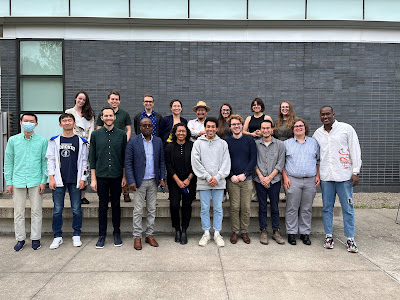Several members of our UofT community presented talks at the 55th Annual Conference on African Linguistics hosted by McGill University, between May 2nd and May 4th.
A complete list of UofT attendees and presenters can be found below.
Liam McFadden, Assistant Professor Samuel Akinbo, PhD Candidate Gregory Antono, Yi-Ting Deng, and Assistant Professor Avery Ozburn presented their work, Mapping African languages.
His first conference outside of UofT, McFadden is an undergraduate student at UofT, who got to combine his knowledge of linguistics and GIS (Geographic Information System) to navigate through the field of language mapping with the goal of engaging the linguistics community in a project of making better maps.
McFadden and the team are excited to see the development of their work in future years, and we at the WHITL are excited to see ACAL 56!
UofT Linguistics Department Presence:
Speakers:
Laura Griffin, Alexander Angsongna - An Analysis of Tone Delinking in Future Contexts in Central Dàgáárè
Liam McFadden, Samuel Akinbo, Gregory Antono, Yi-Ting Deng, Avery Ozburn - Mapping African languages
Keffyalew Gebregziabher - Polar and Wh-questions in Tigrinya
Samuel Akinbo, Tongpan Rabo Fwangwar - Grammatical tones in the Derivation of Verbs from Ideophones in Mwaghavul
Atiqa Hachimi, Gareth Smail - Stylized performance of “mock Berber” in a Moroccan Stand-Up comedy talent show
Juvénal Ndayiragije, Patrick Kinchsular - A comparative analysis of transitive expletive constructions in Kirundi and Germanic
Poster:
Avery Ozburn, Gregory Antono, Saba Mirabolghasemi - Community- and context-based approaches to African linguistics: the Language Profiles Project


